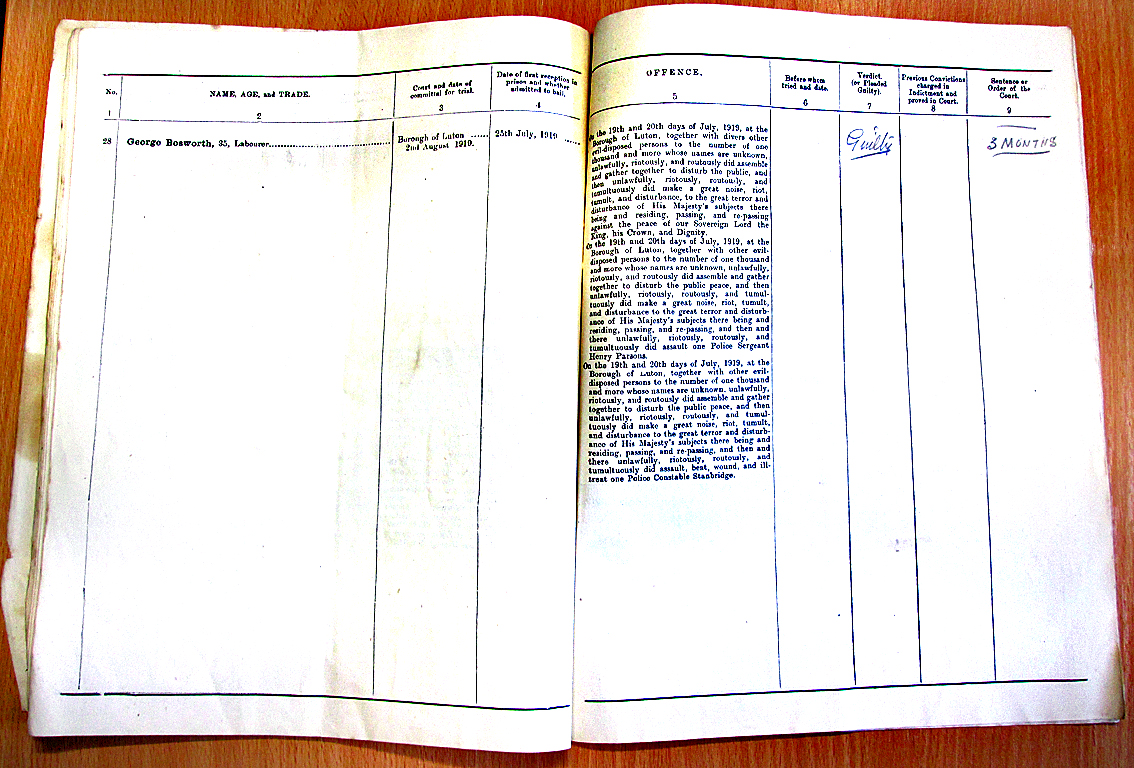
- Assizes record courtesy of Mr John Gillespie, grandson of Insp Fred Janes.
George Bodsworth, aged 35, labourer, of 12 Burr Street, Luton, was charged with: “On the 19th July 1919, together with divers other persons to the number of one thousand or more unlawfully and riotously did assemble to disturb the public peace, and then did make a great riot and disturbance to the terror and alarm of His Majesty’s subjects there being, and against the peace of our Sovereign Lord the King, his Crown and Dignity.”
MAGISTRATES COURT
Bodsworth was remanded in custody when he appeared before magistrates on July 25th, 1919. He said he was not guilty. His statement to Sgt Henry Parsons when arrested was: “Yes, I was there, but I didn't do any harm.”
Sgt Parsons said that on Saturday evening he took part in a charge by the police near the Town Hall. On one occasion witness was separated from the other police officers. Prisoner, who was in the foremost part of the crowd, rushed at him, and witness had to beat the people off with his staff. Prisoner was carrying a large stick, and made several attempts to strike witness.
In a further hearing before magistrates on August 1, Pc Stanbridge said Bodsworth “made a grab for my truncheon and tried to wrest it away from me”. He also alleged prisoner struck him on the chest and “promised to murder” him on the Sunday.
“I didn't take any notice of that blow,” said the constable. “I'd had several before, and got knocked out backwards by a brick, but not by this man.”
The Town Clerk to Bodsworth: “You have been wounded in the war?” Witness: “Yes, severely”.
Sgt Parsons described Bodsworth as “a man who doesn't like work” and was said to have been a bookie's runner, generally standing on street corners. But in reply to a defence question, the officer said he was not aware prisoner had worked for two years after being discharged.
Prisoner was committed for trial on three charges and bail was refused. A plea for bail had been made on account of the condition of prisoner's wife and the fact there were several children.
AT THE ASSIZES
George Bodsworth told Judge Greer at the Assizes that he had spent the evening of Peace Day in a public house, and then went home to Burr Street to supper. Afterwards he started to go to Stanley Street, but the crowd in George Street was too great, and the police were making a baton charge.
In the pushing about, prisoner got to the front, and was at once hit on the head and knocked out. When he came round, he found himself at home.
As to trying to hit Sgt Parsons with a stick, he had more sense than that, and did not have a stick, but if he had been possessed of a stick he would probably have hit back as hard as he was hit himself (laughter). It was not true, either, that he hit a constable with his fist.
All the police knew him and, if he had done anything, they would have had him at once.
As a Reservist he was called up on the outbreak of war and joined the 3rd Rifle Brigade. He was in the retreat from Mons and, after being wounded, was discharged.
Cross-examined, prisoner said Sgt Parsons was an “old pal”. He did not see anyone try to hit the police, but Parsons knocked him down. Prisoner absolutely denied urging the crowd to knock the police down.
Inspector Janes said Bodsworth served in the 1st Rifle Brigade from which he was discharged in 1906. On the outbreak of war he joined the 3rd Rifle Brigade, was with the Colours for two years and was then discharged with a pension.
He had worked at various places, but at the time of the riot was drawing unemployment donation. There were one or two minor convictions against prisoner, and in 1916 he was bound over for stealing metal. Prisoner had five children.
Bodsworth was found guilty of rioting and assaulting the police. He asked the Judge to take into consideration that he had been in custody 13 weeks, and said that had he not been hit first by the police he would never have hit them.
His Lordship said he could not entirely pass over prisoner's share in the affair, and he would go to prison for three months hard labour.
Evidently surprised at the lightness of the sentence, prisoner said to the Judge: “Thank you very much. Wish you a merry Christmas and a happy New Year.”
His Lordship: “And just try to keep a little quieter.” Prisoner: “Yes, I will see that they don't catch me any more.”

